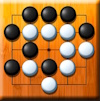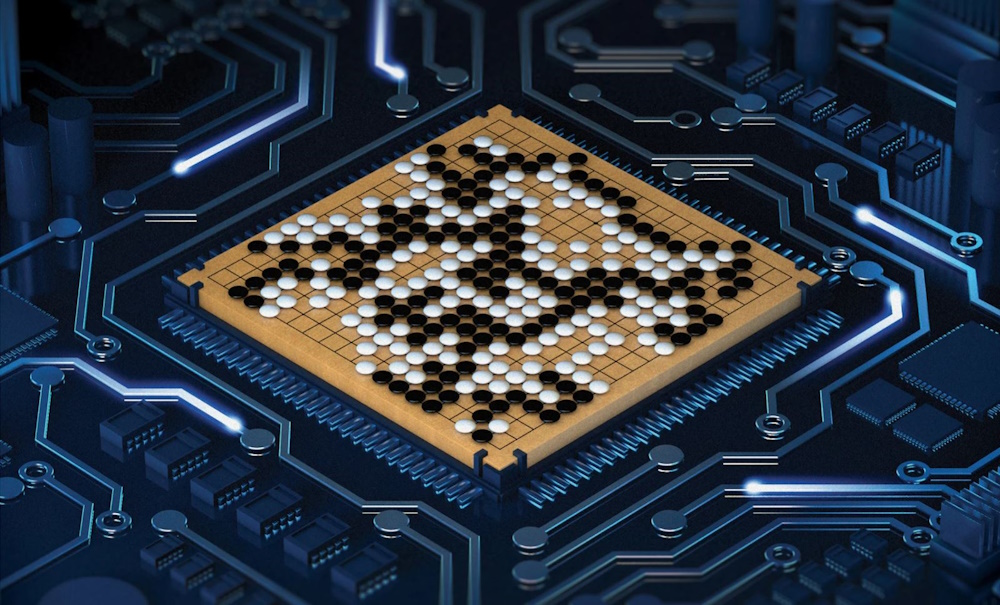 AI Game Playing
AI Game Playing
AI has a rich history of demonstrating its capabilities by conquering challenging human games, beating the best in the world on numerous occasions
Explore: Checkers - Chess - Jeopardy - Go - Poker
AI game playing is a popular application of AI that involves the development of computer programs to play games, such as Checkers, Chess, and Go. The goal of game playing in AI is to develop algorithms that can learn how to play games and make decisions that will lead to winning outcomes.
In addition to being victorious over human experts, AI's game playing prowess over the years was demonstrated on live TV and in the mass media. The Checkers and Jeopardy matches were on American broadcast TV, while Chess and Go were shown to huge international audiences. Each in their own times, these contests awakened the world to the power of AI.
 Checkers
Checkers
AI learned to play checkers in 1952 with the Samuel Checkers-Playing Program, created by Arthur Samuel at IBM, and developed on the IBM 701 computer. The program was a foundational moment in AI history, demonstrating that machines could learn and adapt through computational strategies.
The Samuel Checkers-Playing Program was the first AI program created in the United States. Using techniques like reinforcement learning, it was a self-learning program that improved by playing against itself, thereby introducing machine learning as a concept.
The checkers playing program is considered a landmark achievement in AI, for it pioneered machine learning techniques as well as showing that computers could learn and improve through experience.
Key Achievements
- Was demonstrated on live television in 1956
- In 1961, defeated the Connecticut state checkers champion
- By 1962, beat Robert Nealey, a checkers master
- Used alpha-beta pruning search algorithm to evaluate game positions
- Recorded game positions to improve future decisions
- Developed mechanisms for continuous learning
Learn more. External website links open in a new tab.
- Solid Wood Red and Black Checkers Board Game Set from Amazon
- historictownsofamerica.com/oldest-ai-program
- indiaai.gov.in/article/mastering-minds-a-journey-into-the-legacy-of-the-samuel-checkers-playing-program-1959
- en.wikipedia.org/wiki/Arthur_Samuel_(computer_scientist)
- incompleteideas.net/book/first/ebook/node109.html
 Chess
Chess
AI has a rich history in chess, marked by significant milestones that showcase the evolution of AI in the game. AI's journey in chess has not only transformed how the game is played, but has also influenced broader developments in AI and machine learning. The interplay between human players and AI continues to evolve, with AI serving as both an opponent and a tool for enhancing player skills.
Key Events and Developments
- 1950: Claude Shannon published a foundational paper on programming computers to play chess, outlining strategies for AI.
- 1951: Alan Turing created one of the first chess algorithms, although it was never fully implemented due to hardware limitations.
- 1957: Alex Bernstein developed the first complete chess program that could play a full game on an IBM 704 computer.
- 1985: The Deep Thought project was initiated at Carnegie Mellon University, leading to the development of a powerful chess engine.
- 1989: Deep Thought became the first computer to defeat a grandmaster, Bent Larsen, in a tournament setting.
- 1996: IBM's Deep Blue faced reigning world champion Garry Kasparov for the first time, losing 4-2 but winning one game, marking a significant achievement for AI.
- 1997: In a rematch, Deep Blue defeated Kasparov 3.5-2.5, becoming the first computer to beat a world champion in a match under standard time controls. This victory was pivotal in demonstrating the capabilities of AI.
- 2017: Google DeepMind's AlphaZero revolutionized chess AI by using deep reinforcement learning, teaching itself to play without human knowledge. It defeated Stockfish, one of the strongest traditional chess engines, showcasing the potential for AI to develop novel strategies.
Modern Chess Engines
Today, chess engines like Stockfish and Leela Chess Zero are widely used for analysis and gameplay. These chess AI engines have advanced algorithms and immense computational power to evaluate millions of positions per second. These engines use deep learning to learn from thousands of matches. They regularly have FIDE chess ratings above 3,400, which is far beyond the best human players in the world.
Learn more. External website links open in a new tab.
- Magnetic Wooden Chess Set with Folding Board Travel Game from Amazon
- regencychess.com/blog/artificial-intelligence-and-chess-an-evolving-landscape/
- builtin.com/artificial-intelligence/chess-ai
- chess.com/terms/deep-blue-chess-computer
- linkedin.com/pulse/shared-history-chess-artificial-intelligence-alliance-nigrelli
- chess.com/article/view/computers-and-chess---a-history
- en.wikipedia.org/wiki/History_of_chess_engines
 Jeopardy!
Jeopardy!
In 2011 the DeepQA computer Watson from IBM was crowned champion of Jeopardy, TV's smartest quiz show, and launched an era of natural language processing
IBM's Watson computer made history by defeating two of the TV game show Jeopardy's most successful champions, Brad Rutter and Ken Jennings. Continuing a string of victories in AI game playing for IBM, the event was a groundbreaking achievement for AI in front of millions on live TV. The victory demonstrated AI's growing ability to process and respond rapidly and accurately to complex human language.
The Jeopardy game is played for cash nightly on live TV. The format is to give contestants rapid fire questions containing clues that rely on subtle meanings, puns, and riddles. The program was competed over three nights in February 2011. On the show, Watson was represented by an avatar with moving lines that turned green when Watson produced the correct answer. Watson was hands-down the overall winner, pocketing $77,147 compared to Jennings' $24,000 and Rutter's $21,600.
Key Facts
- Project led by principal investigator David Ferrucci at IBM Research
- Ran on DeepQA, a complex software architecture used to generate hypotheses, gather evidence, and analyze data
- Used ten racks of ten Power 750 servers kept off stage
- Could process and respond to questions in seconds without being connected to the internet
- Analyzed natural language with sophisticated algorithms
- Examined both unstructured clue text and its own stored data
- Took 5 years to develop and by 2010 could consistently beat human Jeopardy contestants
- Demonstrated advanced natural language processing
- Showed AI's potential to understand complex, nuanced questions
Learn more. External website links open in a new tab.
- ibm.com/history/watson-jeopardy
- bbc.com/news/technology
- axios.com/2021/02/13/ibm-watson-jeopardy-win-language-processing
- techrepublic.com/article/ibm-watson-the-inside-story-of-how-the-jeopardy-winning-supercomputer-was-born-and-what-it-wants-to-do-next/
- en.wikipedia.org/wiki/Watson_computer
- nytimes.com/2011/02/17/science/17jeopardy-watson.html
 The Game of Go
The Game of Go
AI's mastery of the game of Go reached a milestone with Google DeepMind's AlphaGo. Its success marked the end of board games as benchmarks for AI capabilities since it proved that machines could master even the most complex strategy games.
Key Achievements
In October of 2015, AlphaGo beat the European champion Fan Hui 5-0. Next March, it defeated Lee Sedol. The victory was a feat considered a decade ahead of expectations. The game earned AlphaGo a 9 dan professional ranking, the first time a computer Go player had received the highest possible certification.
AlphaGo's breakthrough occurred in 2016 when it defeated world champion Lee Sedol 4-1 in a highly publicized match, becoming the first AI to beat a top human player without handicaps. It was recognized as a major milestone in AI research. AlphaGo combined deep neural networks with advanced search algorithms and used reinforcement learning to improve itself through self-play.
Then, in 2017 AlphaGo Master, an upgraded version, beat Ke Jie, the number one player in the world. The impact of the victory not only underscored AI's potential in complex problem-solving, but also inspired new strategies among human players.

Learn more. External website links open in a new tab.
- Large Magnetic Go Game Board Set from Amazon
- deepmind.google/research/breakthroughs/alphago/
- linkedin.com/pulse/alphago-game-changing-ai-mastered-go
- illumin.usc.edu/ai-behind-alphago-machine-learning-and-neural-network/
- timelines.issarice.com/wiki/Timeline_of_AlphaGo
- en.wikipedia.org/wiki/Computer_Go
- latimes.com/world/asia/la-fg-korea-alphago-20160312-story.html
- en.wikipedia.org/wiki/AlphaGo
- britgo.org/computergo/history
 Poker
Poker
AI has made significant progress in poker. These advancements have not only revolutionized poker AI, but have also contributed to broader AI research in decision-making under uncertainty and multi-agent systems.
Poker, a centuries-old card game, has been a popular pastime for generations of players worldwide. Over time, the game has evolved into a sophisticated contest of skill, strategy, and psychology. Traditionally, poker players have relied on their intuition, experience, and mental prowess to gain an edge over their opponents.
Some of the challenges faced in AI poker are handling imperfect information, adapting to multiple opponents, balancing exploration and exploitation, and managing "all-in" situations. Poker has always been a challenging area for AI research due to the complexity of the game and the need to make decisions with incomplete information. Bluffing is an important part of poker and AI systems must be able to successfully recognize and use bluffs. Going "all-in" is also a challenge for AI poker since these situatins involve making key decisions with limited information.
Key Developments
- 1984: Mike Caro created Orac, a basic poker AI for the World Series of Poker. The University of Alberta, University of Auckland, and Carnegie Mellon University led early research.
- 2015: Cepheus solved heads-up limit hold'em
- 2017: Libratus defeated top pros in heads-up no-limit Texas Hold'em
- 2019: Pluribus beat elite players in six-player no-limit Texas Hold'em
AI Poker Systems
- Deepstack: Developed by DeepMind, used deep learning and heuristic search, winning 49 big blinds per 100 hands
- Libratus: Demonstrated superhuman ability in heads-up games
- Pluribus: Developed by Meta, was the first AI to beat pros in 6-player poker, winning about $1,000/hour
The technology involved in AI poker systems includes neural networks and deep learning, Counterfactual Regret Minimization (CFR), opponent modeling and adaptive strategies, reinforcement learning, and self-play.
Learn more. External website links open in a new tab.
- 300-piece Poker Set with Aluminum Carrying Case from Amazon
- pokernews.com/news/2017/10/artificial-intelligence-poker-history-implications
- youtube.com/watch?v=NWS9v_r_IWk create a poker bot
- ai.meta.com/blog/pluribus-first-ai-to-beat-pros-in-6-player-poker/
- en.wikipedia.org/wiki/Computer_poker_players
- pokerbotai.com/blog/statistical-machine-learning-advances-for-poker-ai-in-cash-games/
- science.org/content/article/artificial-intelligence-goes-deep-beat-humans-poker
- pokerbankrollapp.com/The-Rise-of-Artificial-Intelligence-in-Poker/
- geeksforgeeks.org/deepstack-vs-pluribus-which-ai-dominates-in-poker-strategy/
- technologyreview.com/2017/01/11/154629/poker-is-the-latest-game-to-fold-against-artificial-intelligence/
- primedope.com/implementing-ai-poker-player-which-fashions-bio-inspired-way/
- poker-ai.org/poker-ai-for-texas-holdem/
 Links
Links
History of AI Game Playing